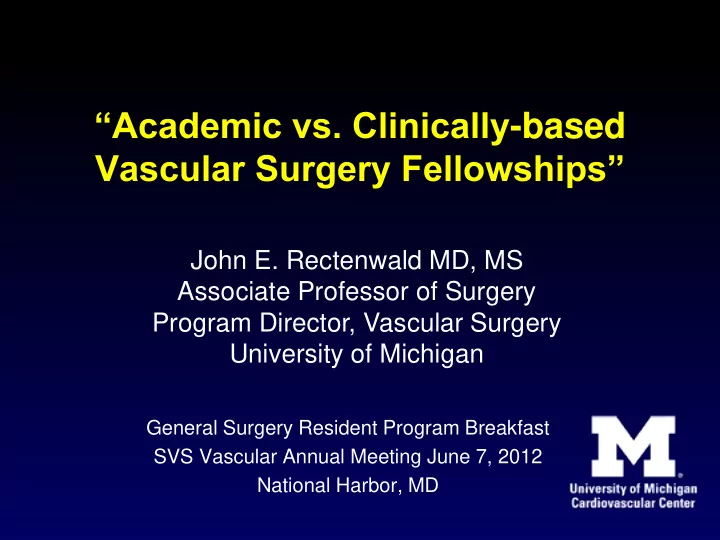

“Academic vs. Clinically -based Vascular Surgery Fellowships” John E. Rectenwald MD, MS Associate Professor of Surgery Program Director, Vascular Surgery University of Michigan General Surgery Resident Program Breakfast SVS Vascular Annual Meeting June 7, 2012 National Harbor, MD
Society for Vascular Surgery Disclosure Slide General Surgery Resident Program Breakfast 2012 SVS Vascular Annual Meeting
Society for Vascular Surgery Disclosure Slide • My younger brother, Joe, is a private practice orthopedic & hand surgeon in Augusta, GA. • Trained in clinically- based programs • Questioned my sanity re: pursuing academics General Surgery Resident Program Breakfast 2012 SVS Vascular Annual Meeting
Why would you do an academic fellowship? • Interested in a career in academic surgery • Interested in a research experience – If you like to ask questions and find answers • Case quality/complexity • Access to resources, networking • Don’t care for the “business” aspects of modern medicine – you’d rather teach • You like the “pomp and circumstance” of an academic program
Why you might NOT do an academic fellowship • No interested in an academic career • Do not want to compete with “other learners” • Want to do “bread and butter” cases • Want to do lots of “bread and butter” cases – Case volume • Desire to be prepared for private practice environment • Value efficiency
Who are these other learners? • General Surgery Residents • 0+5 vascular residents • NP/PA/nurses • Medical students • Radiologists • Cardiologists • Neurosurgeons
Why would you do an clinically-based fellowship? • Interested in private practice career – Not that interested in research or teaching • Want to be prepared for the “business” of medicine • Interested in front-line practice – In the trenches, all the time • You don’t want to compete with “other learners” • Value efficiency
Why you might NOT do an clinically-based fellowship • The opportunity to do research and teach in the future is important to you – Plan a future in academic surgery • You want to do a lot of complex cases on a regular basis during your training • You like taking care of “challenging” (aka very ill) patients with “significant” (severe) vascular disease • You were dropped on you head at birth
Can I go into academics if I do a clinically-based fellowship? • Short answer is yes… but it might be difficult • A clinical fellowship might not emphasize what academic department looks for in future hires – Publications, research… • Conventional wisdom says that is easier to go from an academic training program to private practice and from a clinical training program to an academic practice • Check the track record of the fellowships you are interested in
Am I committed to an academic practice if I do an academic fellowship? • Short answer is no • Since the UM Vascular Fellowship started in 1982… – We have graduated 24 fellows – 18/24 (75%) have stayed in academics – 6/24 (25%) have gone into private practice • Again, check the track records of the fellowships you are interested in
If I choose an academic fellowship how can I prepare for a career in private practice? • Billing + coding • Establishing a referral base • Covering call • Understanding contracts • SVS courses • Off-site rotations
Can you really get research done in the two years of fellowship? • You will have the opportunity to write book chapters, review articles, moderate • Ask about research commitment, expectations, and protected research time • Our last 10 fellows published 55 papers (basic science + clinical) – average of 5.5 papers during their fellowship years • Clinical programs are less likely to have this opportunity, especially in basic science
Differences in Case Volume and Distribution Case Volume Requirements Minimum # Abdominal 30 Cerebrovascular 25 Peripheral 45 Complex 10 Endovascular Therapeutic 80 Endovascular Diagnostic 100 Endovascular Aneurysm repair 20 Minimum required cases 315
Case Numbers- Graduating Senior Vascular Fellow Primary Required Secondary Total Abdominal 91 30 20 111 Cerebrovascular 92 25 15 107 Peripheral 50 45 7 57 Complex 101 10 40 141 Endovascular 39 100 201 240 Diagnostic Endovascular 107 80 73 180 Therapeutic Endovascular 34 20 4 38 Graft Total Major Open 334 82 416 874
Other Differences in the training paradigms… • Niche cases- complex vascular surgery- are more often seen in academic programs – Fenestrated stent grafts, TAAA, pediatric vascular • Faculties at academic programs tend to be larger – More points of learning • Faculties in clinically-based programs tend to be smaller – More personal and more like an apprenticeship
Other Differences in the training paradigms… • Practices and hospitals at clinically-based programs tend to be more streamlined and efficient – Less scut, fewer Tylenol calls, fewer distractions • Clinically-based programs tend to have more amenities for trainees (or rather they have them in place for the staff and allow trainees access) – Surgeon’s lounges, doctor’s cafeteria,
Summary • Both types of training programs have their advantages and disadvantages • Both have and will continue to produce well trained and competent vascular surgeons • Choose a program type based on your future practice goals • When in doubt, I would recommend choosing an academic program
Celiac/Hepatic Artery Left Renal Artery Graft Graft SMA Graft Right Femoral Conduit Right Renal Artery Graft
Recommend
More recommend